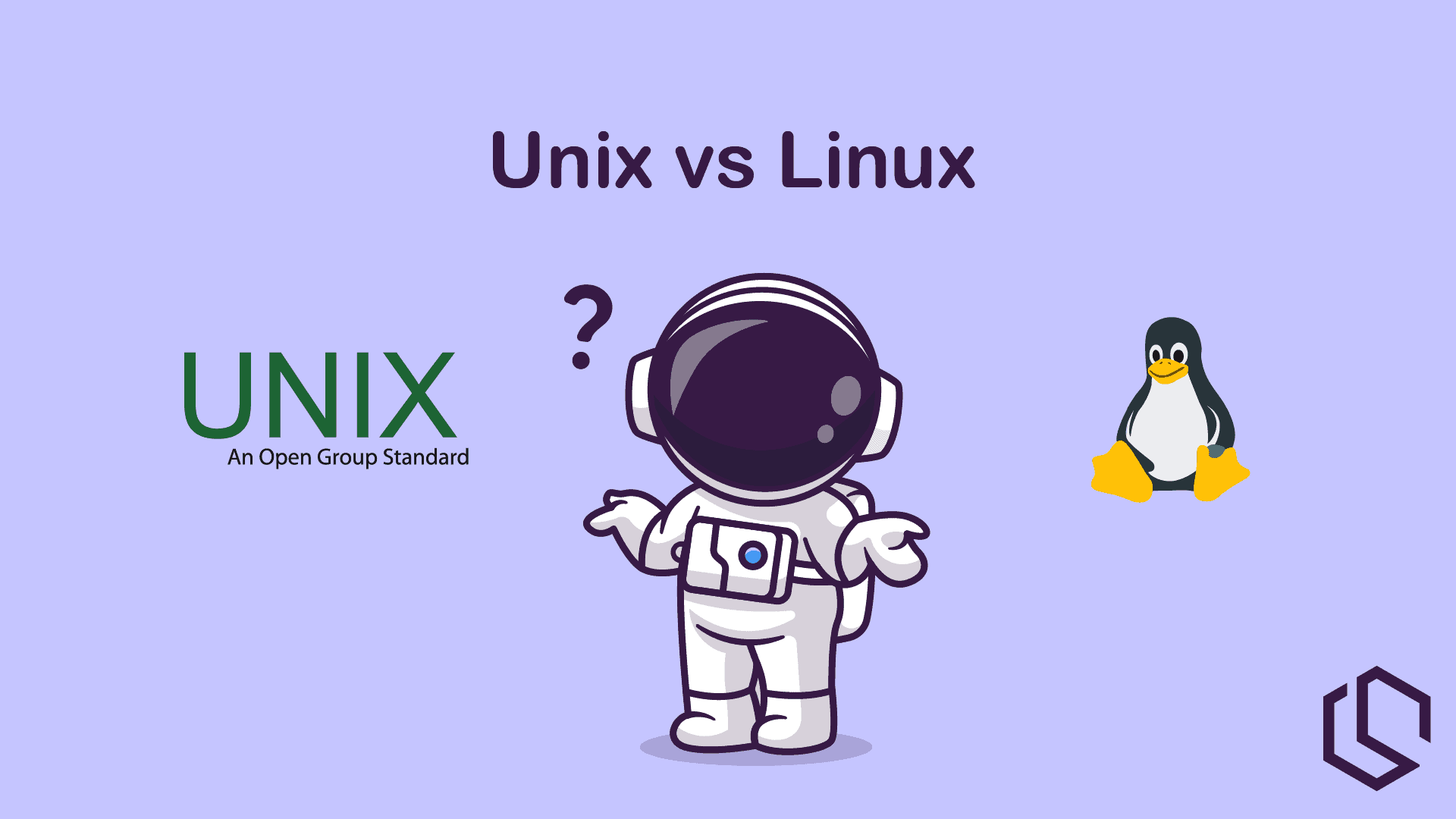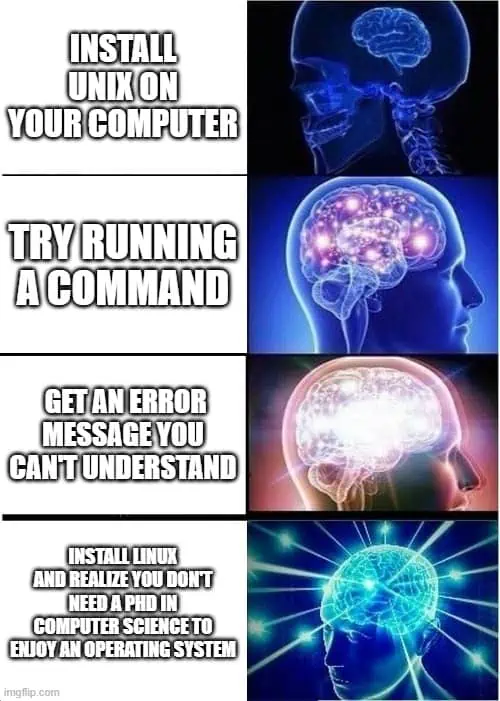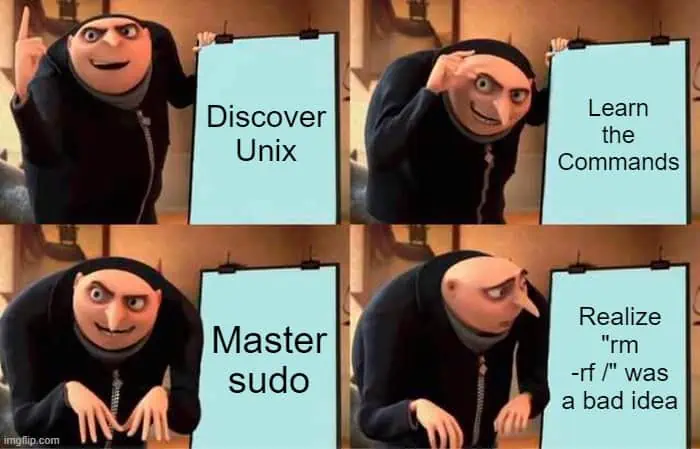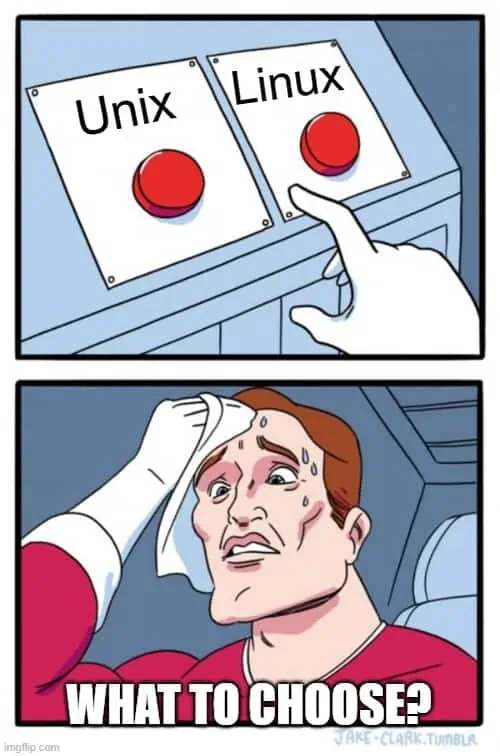Unix vs Linux
Explore the practical differences between Unix and Linux. No dramatic clashes or epic showdowns here, just a straightforward breakdown with memes of what sets these operating systems apart. Gain insights to make informed choices in the world of Unix vs Linux.

Are you caught in the web of confusion, wondering if Linux and Unix are long-lost twins or fierce competitors? Don't worry 😅 You're not alone in this tech maze. Many folks out there are juggling these terms as if they're interchangeable.
In this blog post, we're diving into the Linux vs Unix showdown, and I promise it'll be anything but your typical tech lecture. Get ready for a ride of wit and wisdom, and by the end, you'll be like a pro in the Linux-Unix universe! 🥳

Let's start by figuring out what each of the two operating systems are. I won't go too much into detail as that would be a bit off-topic, and I think that an in-depth article for each of the two systems would be in place for that. 😎
What is Unix?
Unix, born in the 1970s at AT&T Bell Labs, is the original operating system – the granddaddy of them all. Picture a time when tech dreams were high, and Unix was designed to be a multi-talented multitasker.

Now, here's the cool part! 🤯 Unix was the trendsetter in the graphical user interface (GUI) arena. Think drag-and-drop, mouse-clicking magic – all the stuff that makes today's computing a breeze. Unix was the cool kid before cool even existed. Awesome right!? ✌️
Fast forward, and Unix isn't just a retro tale. It's the unsung hero that influenced the heavyweights – Linux, MacOS, Windows. Every time you navigate your digital realm, remember, that Unix sets the stage. It's not just history, it's the rockstar that kicked off the computing revolution!

Today, Unix isn't just a dusty relic of the past... Unix is still flexing its tech muscles in crucial arenas like academia, science, and industry. Imagine Unix as the wise old sage guiding critical operations behind the scenes. 🧓
What is Linux?
Linux, born from the mind of Finnish student Linus Torvalds in 1991, stands as a testament to the power of open-source innovation. Originating from the Unix kernel, Torvalds envisioned a free and improved Unix variant for his personal computer. To bring his vision to life, he generously shared Linux's source code on the internet, extending an invitation to fellow programmers to join him in its development. 🧑💻

From those humble beginnings, Linux has burgeoned into a vast community of developers and users. This collective effort results in various Linux distributions, including but not limited to Ubuntu, Fedora, Mint, Debian, and more. It's not just an operating system, it's a dynamic ecosystem fueled by collaboration and passion.

Tech enthusiasts, programmers, hackers, and champions of freedom find solace in Linux's open embrace. Its influence extends beyond personal computers to servers, supercomputers, embedded devices, and smartphones. From a humble Raspberry Pi to a sophisticated NASA rover, Linux adapts seamlessly to diverse hardware. 🚀
Linux earns its stripes through remarkable stability, security, and performance. A rare breed, it defies crashes, viruses, and the sluggishness that plagues other systems over time.
How Do Unix and Linux Defer From Each Other?
Alright, now you have a very basic understanding of both operating systems. Have you been thinking about the difference? Well, let's have a look at the main/core differences between Unix and Linux.
Open vs. Closed 🔓
Linux is free, open-source, and available for all to download, modify, and share. Unix is proprietary, closed source, and owned by various companies with usage fees.
Transparency and Security 🪪
Linux is transparent and secure, open to inspection and modification by the community. Unix is closed and more vulnerable, accessible only to owners for updates.
Flexibility vs. Rigidity 💪
Linux is flexible and customizable, offering a range of distributions, desktop environments, applications, and settings. Unix is rigid and standardized, users are limited to default options with potential compatibility and support challenges.
Compatibility 🔌
Linux is compatible with various hardware and software, catering to a broad audience. Unix on the other hand is more limited and exclusive, tailored to specific systems.
Innovation vs. Legacy 💡
Linux is modern and innovative, regularly updated and improved by a vibrant community. Unix is ancient and outdated, receiving rare updates from owners focused on legacy maintenance.
Adaptability to Trends 🚀
Linux will adapt to the latest technologies and trends, such as cloud computing, artificial intelligence, and gaming. Unix is more suited for traditional tasks like data processing, file management, and printing, often lagging in embracing newer trends, sadly.
Which Operating System Is the Best?
So, when it comes down to the showdown between Linux and Unix, the answer isn't black and white 😅 it's more about shades of perspective and purpose. If you're all about a free, open, flexible, and modern operating system, Linux is your go-to.
On the flip side, if you are in the market for a costly, closed, rigid, and somewhat antiquated operating system, Unix might be just what you are looking for. As you might have guessed... There's no one-size-fits-all answer to this debate. Both Linux and Unix have their strengths and weaknesses, finding their usefulness in different scenarios.

The best way to crack this code is to take them for a spin yourself. Dive into Linux by downloading, installing, or using live CD/USB options without affecting your current system. ✌️
If you're feeling adventurous, dip your toes into Unix—whether you have access to a Unix machine or are willing to splurge on a Unix license 🤑 You can also get a taste of Unix through MacOS or iOS, which share its lineage.
It all depends on what you prefer and the project that you require an image for. Try both, analyze what suits the solution best, and then stick to it.
Summary
In this short article about Unix vs Linux, we have taken a brief view of both operating systems. You now have a high-level understanding of each operating system and its forces.
We also took a look at the main differences between the systems and what operating system suits our project best/what OS should we choose?
I hope this short article provided you with new learnings and that you now are one step closer to making the right decision for your project and have a much better understanding of the difference between the two operating systems. ✌️

